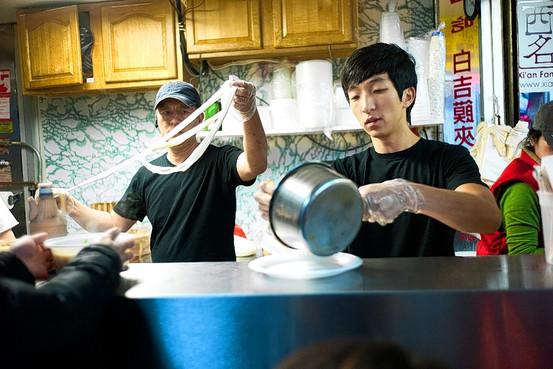 Ken Maldonado for The Wall Street Journal
Ken Maldonado for The Wall Street Journal
David 'Liang Pi' Shi, left, and Jason Wang of Xi'an Famous Foods at their original Flushing, Queens, location.
From a tiny food stall in a Flushing basement, Xi'an Famous Foods made a mark on the city's culinary world with its hand-pulled noodles and spicy Chinese fare.
Five years later, the father-son team behind the food with a cult following has four postage-size restaurants and plans for many more.
Jason Wang and his father, David "Liang Pi" Shi, are in the process of building a commissary in a vacant warehouse in East Williamsburg. The 5,000-square-foot space will have a model kitchen, training center and a production facility for frozen food they eventually hope to sell at local grocery markets. They project that it will be up and running in the next three to four months.
"At least a dozen restaurants can be serviced from there," said Mr. Wang, 22 years old and a recent graduate of Washington University in St. Louis.
Xi'an Famous Foods is a family-run business with no outside investors and a secret spice mix and sauce that it holds under lock and key. Plans for the commissary include a locked chamber where Mr. Shi will make the family recipes that are an integral part of Xi'an's dishes.
The modest street-food style food where a cumin lamb burger runs $3, and a plate of cold skin noodles, under $5 has attracted attention from near and far, including from the foodie television shows of Anthony Bourdain and Andrew Zimmern.
"I go there all the time, I love it so much," said Mr. Zimmern, who has featured Xi'an on two of his shows. "I find it seminal. You could dip a day-old shoe into his chili oil and stuff it with roasted lamb and I would still eat it and love it."
Rick Federico, chief executive officer and president of P.F. Chang's China Bistro Inc., said he was intrigued by the lamb and stewed pork burgers when he went to one of the Manhattan locations on a culinary tour of New York. "We were thinking about how we might apply a sandwich into our business," he said. He called the food "phenomenal." "I love the fact that it's deep in family history, yet they put a little bit of a contemporary twist on it," he said.
Mr. Wang said they are currently scouting locations in midtown and Brooklyn for future locations. Until now, solicitations from potential investors or franchisees as well as inquiries about its recipes have been turned down or put on hold until they develop an infrastructure.
Mr. Wang trademarked Xi'an Famous Foods recently. Once the commissary is open, the father-and-son partners intend to apply to food regulators for approval so that they can sell some frozen dishes at local supermarkets.
Mr. Wang and his father are also exploring franchising the restaurant group and opening to outside investors, with long-term goals of expanding outside of the New York metropolitan area.
"I'm trying to make it into more of a brand," said Mr. Wang.
The story of Xi'an Famous Foods begins in Xi'an, the original capital of China and now the capital of the Shaanxi province in central China. The region is famous for its spicy food and street snacks, and Mr. Shi's grandfather ran a popular, street food-type restaurant, said Mr. Shi, speaking in his native Mandarin, translated by his son.
While much of the focus on Xi'an Famous Foods has come from its hand-pulled noodles, the owners say the secret is really its spice mix and signature sauces, composed of 20 to 30 different spices and herbs using a family recipe.
"It's very difficult to make," said Mr. Shi of his black vinegar and soy sauce-based sauce. "It's the combination and the process of making it. The portions are very hard to replicate. The temperature has to be right. Even if you're a chef from China very used to the spices, you can tell what could be in there but you don't know what else is in it, you don't know how much is in it or how to cook it."
Cooks in Xi'an's restaurants are trained in how to make the chewy noodles, which contain no additives. But no one is schooled in how to make the spice mix not even Mr. Wang, though he will be the next proprietor of the family recipe.
"It's the heart and soul of our product," said Mr. Shi.
Father and son don't always agree. While Mr. Shi envisions adding more dishes and opening up a sit-down restaurant, Mr. Wang wants to stick to what they do best: quick, made-to-order food from a little-known region of China.
"That's not who we are," he said. "We're like a street-food place."
Related News
Photos
More>>trade
- China may become a garlic importer instead of exporter
- Mastronardi Produce once again named One of Canada's 50 Best Managed Companies
- Colombia and China discuss US$7.6B Pacific-Atlantic railway line
- China: Zhangpu Yicai vegetable season comes to an end
- T18 Group introduced new tricolour packaging at Fruit Logistica 2011
market
- Tozer's Wildfir rocket variety helps Bakkavor achieve first to market launch
- Ukraine: Wholesale space offerd at the "Stolychny" wholesale market in Kyiv
- China: FRESHARE for Dalian Yidu Group
- China NGO connect: project preparation meeting in Paris
- International Symposium Chinese Women Organizing: Looking Back, looking forward





